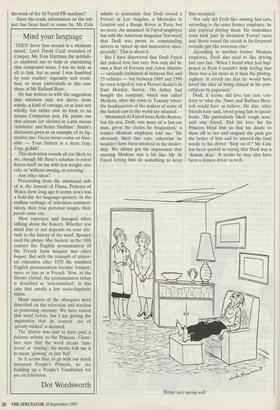Mind your language
`THEY drove him around in a whiskum snivel,' Lord David Cecil recorded of Cowper. Mr Tom Hartman the publish- er implored me to help in elucidating that compound noun. I was no help at all to him, but as usual I was humbled by your readers' ingenuity and erudi- tion, or more particularly in this case those of Mr Richard Rose.
He has written in with the suggestion that whiskum may not derive from whisky, a kind of carriage, or at least not wholly, but rather owe its form to an arcane Cowperian pun. He points out that uiscum (or viscum) in Latin means `mistletoe' and hence 'birdlime'. Smith's dictionary gives as an example of its fig- urative use: Viscus merus vestra est blan- ditia — Your flattery is a mere trap. Trap, geddit?
This derivation sounds all too likely to me, though Mr Rose's solution to snivel forces itself on me with less weight: sine velo, or 'without awning, or covering'.
Any other ideas?
Prescinding from the emotional side of it, the funeral of Diana, Princess of Wales (how long ago it seems now) was a field-day for language-spotters. In the endless verbiage of television commen- tators, their true personal usages, their parole came out.
Most reporters said beauquet when talking about the flowers. Whether you mind that or not depends on your atti- tude to the history of the word. Spenser used the phrase May buskers; in the 18th century the English pronunciation of the French form bouquet was often boquet. But with the triumph of univer- sal education after 1870 the standard English pronunciation became bouquet, more or less as in French. Now, in the Shorter Oxford, the pronunciation bokay is described as `non-standard'; in this case that entails a low socio-linguistic status.
Many aspects of the obsequies were described on the television and wireless as possessing enormity. We have visited that word before, but I am getting the impression that its 'correct' use of `greatly wicked' is doomed.
The Queen was said to have paid a fulsome tribute to the Princess. Cham- bers says that the word means 'nau- seous' or 'cloying'; the media folk use it to mean 'glowing' or just 'full'.
So it seems that, to go with our much mourned People's Princess, we are building up a People's Vocabulary for use on television.
Dot Wordsworth


































































 Previous page
Previous page